An article in this week’s Wall Street Journal‘s Health column–Can Echinacea Melt Winter’s Colds and Flu? –is illustrative of some limitations of the media’s role as a purveyor of scientific information. Specifically, the writer opted to highlight two scientifically flawed trials, without mention of a 2014 Cochrane Database Systematic Review on the topic, a review that encompassed 24 double-blind trials with 4631  participants, and that found no benefit for echinacea over placebo. The role of echinacea in the common cold has been evaluated previously as an example of the inconsistencies in how media translate scientific studies–and, in this case, three systematic reviews of the topic–to construct advice to their readers about echinacea.
participants, and that found no benefit for echinacea over placebo. The role of echinacea in the common cold has been evaluated previously as an example of the inconsistencies in how media translate scientific studies–and, in this case, three systematic reviews of the topic–to construct advice to their readers about echinacea.
The Wall Street Journal‘s Health writer leads with her summary of the findings of 2 studies on the benefits of echinacea in viral respiratory infections:
The Verdict: A study in 2015 found a hot drink containing echinacea to be as good as prescription Tamiflu for treating influenza, and a large 2012 study found the
remedy cut down on the number of days suffered with colds.
Neither component of her verdict is a precise summary of the referenced study. Both studies are funded by the echinacea’s manufacturer, Bioforce. Most concerning is the initial claim, that Bioforce’s echinacea preparation is “as good as prescription Tamiflu for treating influenza.” The 2015 study (in Current Therapeutic Research) cited randomized patients with “clinically diagnosed influenza illness”–those with symptoms typical of influenza–to receive either Bioforce’s Echinaforce Hotdrink or oseltamivir (Tamiflu). Of course, oseltamivir is only effective in influenza; the study group likely included many patients who had non-influenza viral infections and thus would not be expected to improve at all with oseltamivir. Of the 473 study subjects, 41 had test-confirmed influenza. Despite this flaw, the study authors, all funded by Bioforc e, conclude “treatment of influenza with Echinaforce Hotdrink overall outperformed treatment with oseltamivir in the studied patient cohort”. The WSJ quotes the author of a New England Journal of Medicine study showing no benefit from echinacea, who notes that the absence of confirmed influenza in much of the Bioforce study’s patient population undermines the Bioforce study’s validity.
e, conclude “treatment of influenza with Echinaforce Hotdrink overall outperformed treatment with oseltamivir in the studied patient cohort”. The WSJ quotes the author of a New England Journal of Medicine study showing no benefit from echinacea, who notes that the absence of confirmed influenza in much of the Bioforce study’s patient population undermines the Bioforce study’s validity.
The 2012 study (in Evidence-Based Complementary and Alternative Medicine) of Echinacea-vs.-placebo states “Echinacea reduced the total number of cold episodes”; however, the comparison between total number of episodes was not significant. Although the study did find a statistically significant difference in the number of days of cold symptoms, the authors eagerness to draw unfounded conclusions from their analyses are a threat to the study’s validity.
Although media bias in coverage of medical research is neither new nor limited to herbal remedies such as echinacea, if nothing else, this topic provided an excuse to behold lovely flower photos mid-January. It also provides a chance to remind readers it is still not too late to get your flu vaccine!

Who else should then fund the clinical trials if not the companies itself? And cheating in clinical trials is today almost impossible given the tight regulations on data handling and statistical analyses. I dont think that the two mentioned studies are framed, they are very well made.
LikeLike
Thanks for your comment. My post reviews my concerns about the flaws in the two studies. Were I reviewing them, I would not have recommended publication due to these flaws. There are strict regulations regarding human subjects conduct; I am not sure what regulations you refer to regarding statistical analysis. There is great need for neutral parties, such as publicly funded entities, to fund clinical trials, so that non-neutral parties, including pharmaceutical companies, are not the primary source of information about their products’ efficacy.
LikeLike